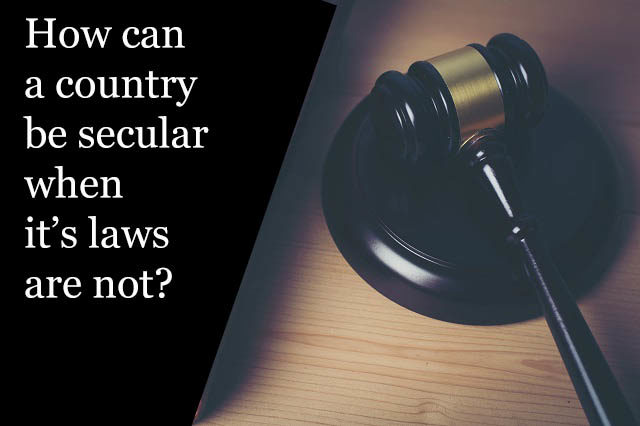India is a strange land indeed! It is a land of peculiar paradoxes and curious contradictions. While on the one hand, we are a secular nation…yet, on the other hand, we have personal laws that are based on religious texts and teachings. I mean…think about it: How can we call ourselves a “secular” country when our people are governed by their own personal laws that are based on their respective religions?!?

And…what if someone wants to be truly “secular” and not let these personal laws govern and dictate his or her life? What if someone is an atheist and does not believe in religion?!?
And…What IF someone believes in the constitution that says that every citizen of this country is equal and cannot be discriminated against?!? [Of course, don’t bother answering for that is truly a rhetorical question.]
Of course, there are people who are going to protest that we do have the Special Marriage Act in place that allows for people from different faiths to tie their nuptial knots…yet, the reality remains that the Special Marriage Act too has its own faults/limitations (the details of which will be covered in a subsequent article. For now, just remember that the Special Marriage Act does not negate or even counter-balance the personal laws that are based on people’s respective religions.)
This is because Indians are still governed by their respective personal laws, which govern the following areas of an individual’s life, namely: 1) Marriage, 2) Divorce, 3) Inheritance, 4) Succession, 5) Custody, and 6) Maintenance. As evident, these areas pretty much cover an individual’s entire civic life. In other words, if we were talking specifics…you are born “unequal” in a land that promised “equality” to all its citizens. I wonder how can we then call ourselves “secular”?!?
Too often, I feel that the debate that Shah Bano case kickstarted regarding the ‘Uniform Civil Code’ was not really about “uniformity” at all even though the entire debate has been centred around ‘gender equality’. In fact, let me say this out loud so that we all understand this once and for all: “Uniform Civil Code is not about gender equality”!
The debate that concerns the Uniform Civil Code at its heart, in fact, is really about one simple thing: how can secular and religious laws coexist at the same time? In fact, let me go so far as to say that simple common sense would beg us to ponder the following question: If we’re using religion as a basis to define our laws, how can we call ourselves secular? The statement itself is logically fallacious! [Note: I’m sure Aristotle, who gave us the Law of non-contradiction (i.e. “Two or more contradictory statements cannot both be true in the same sense at the same time”) – a part of the three laws of thought – would be shaking his head in disbelief every time he hears us calling ourselves “secular”. After all, how can a country be secular when it’s laws are not?!?































